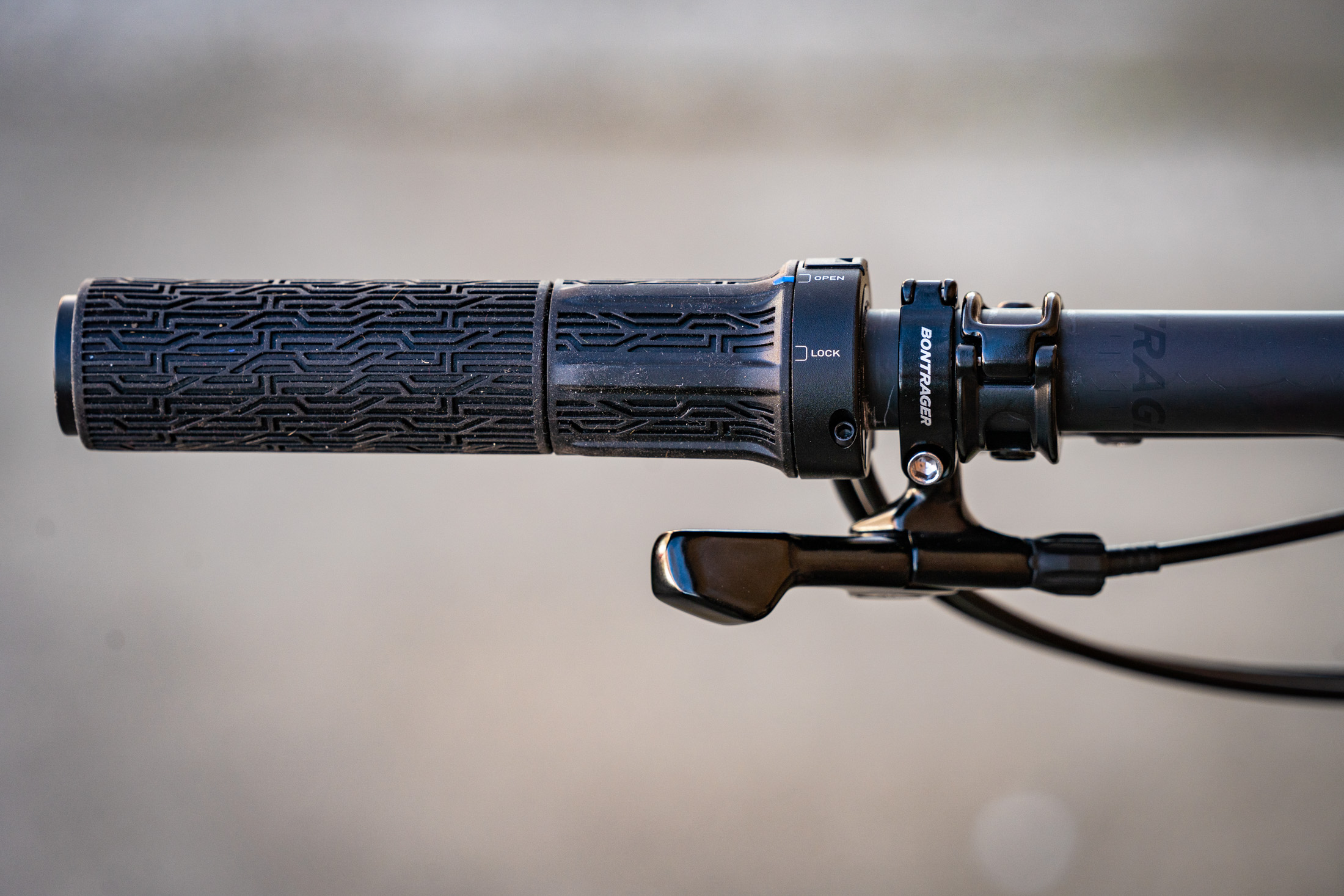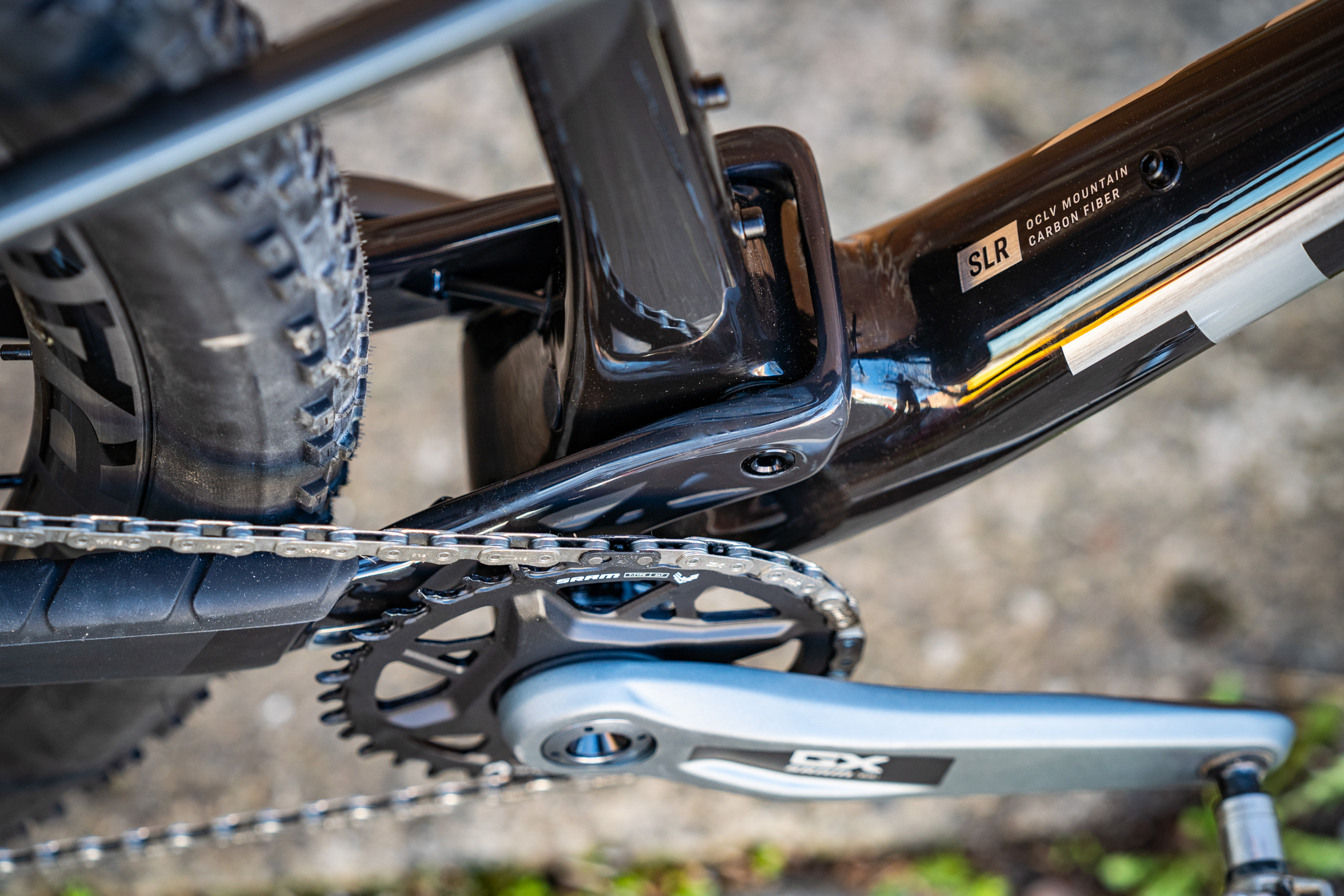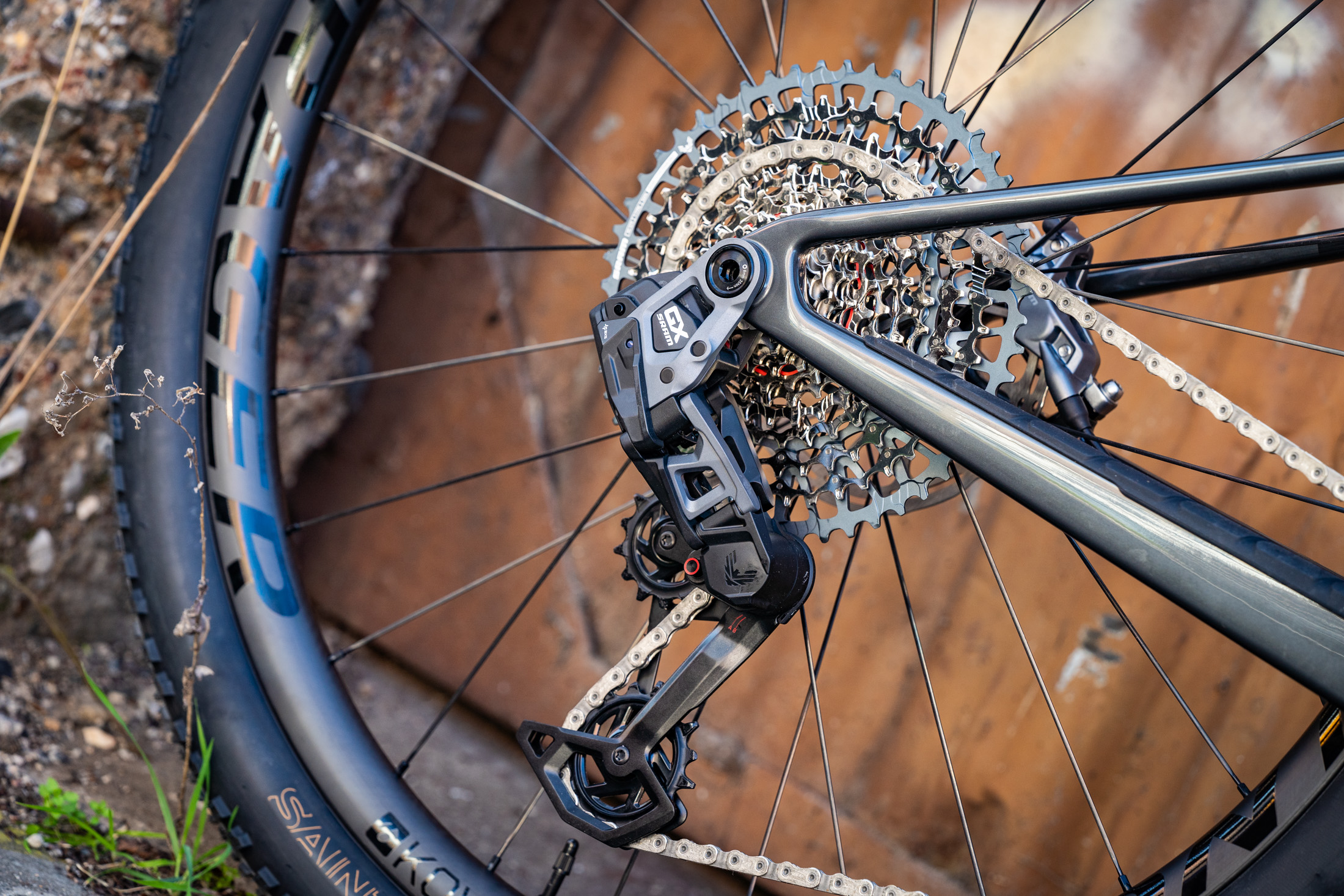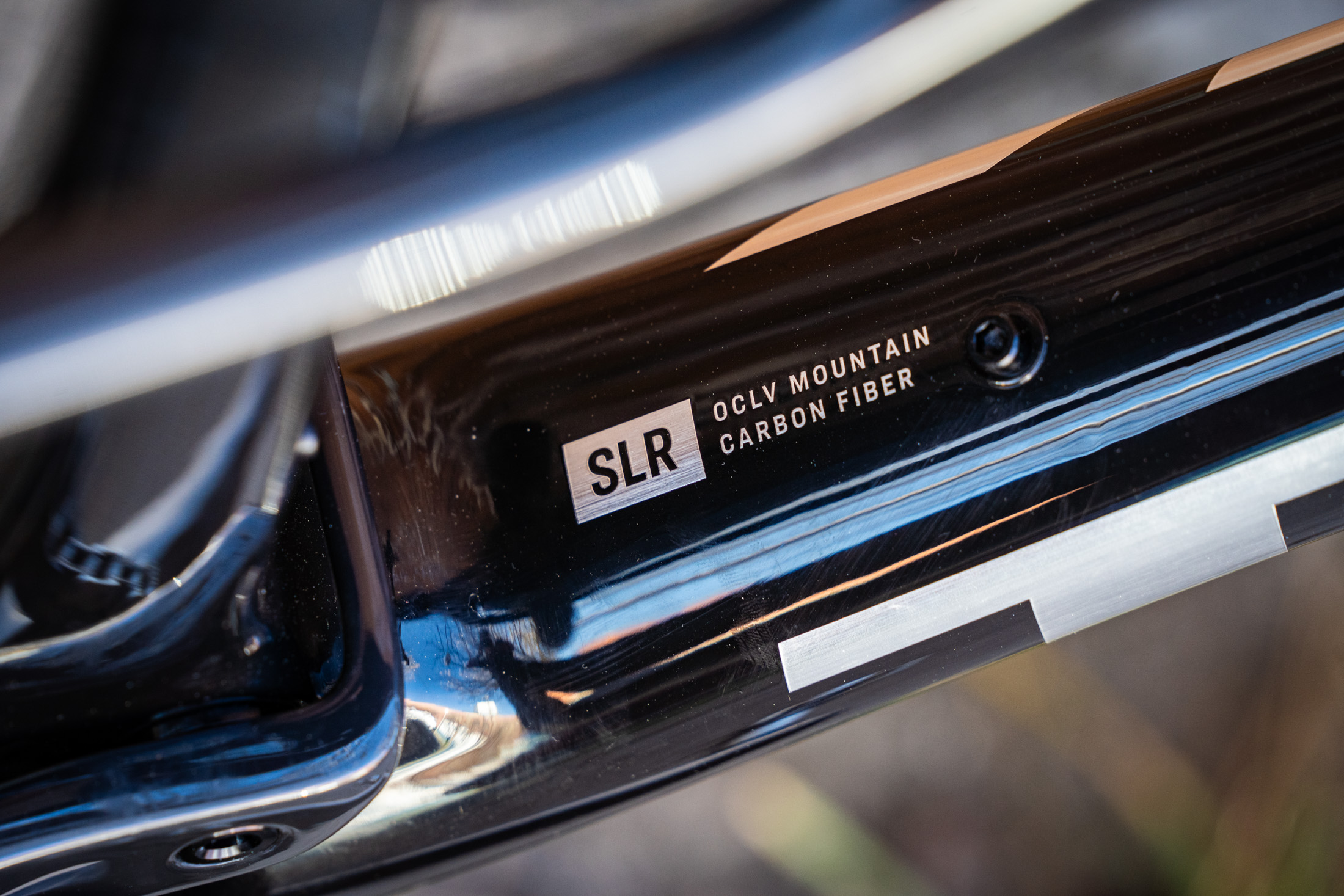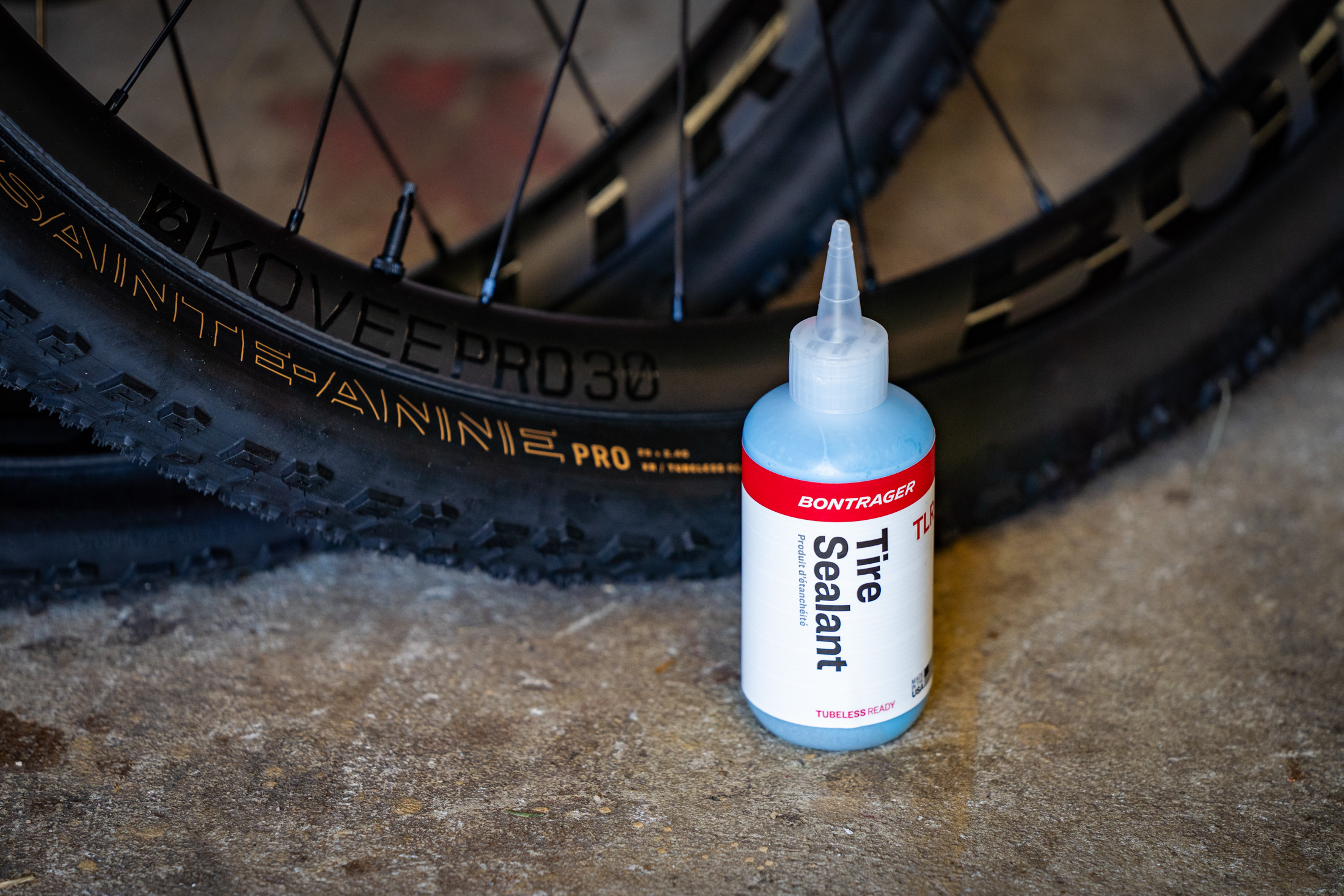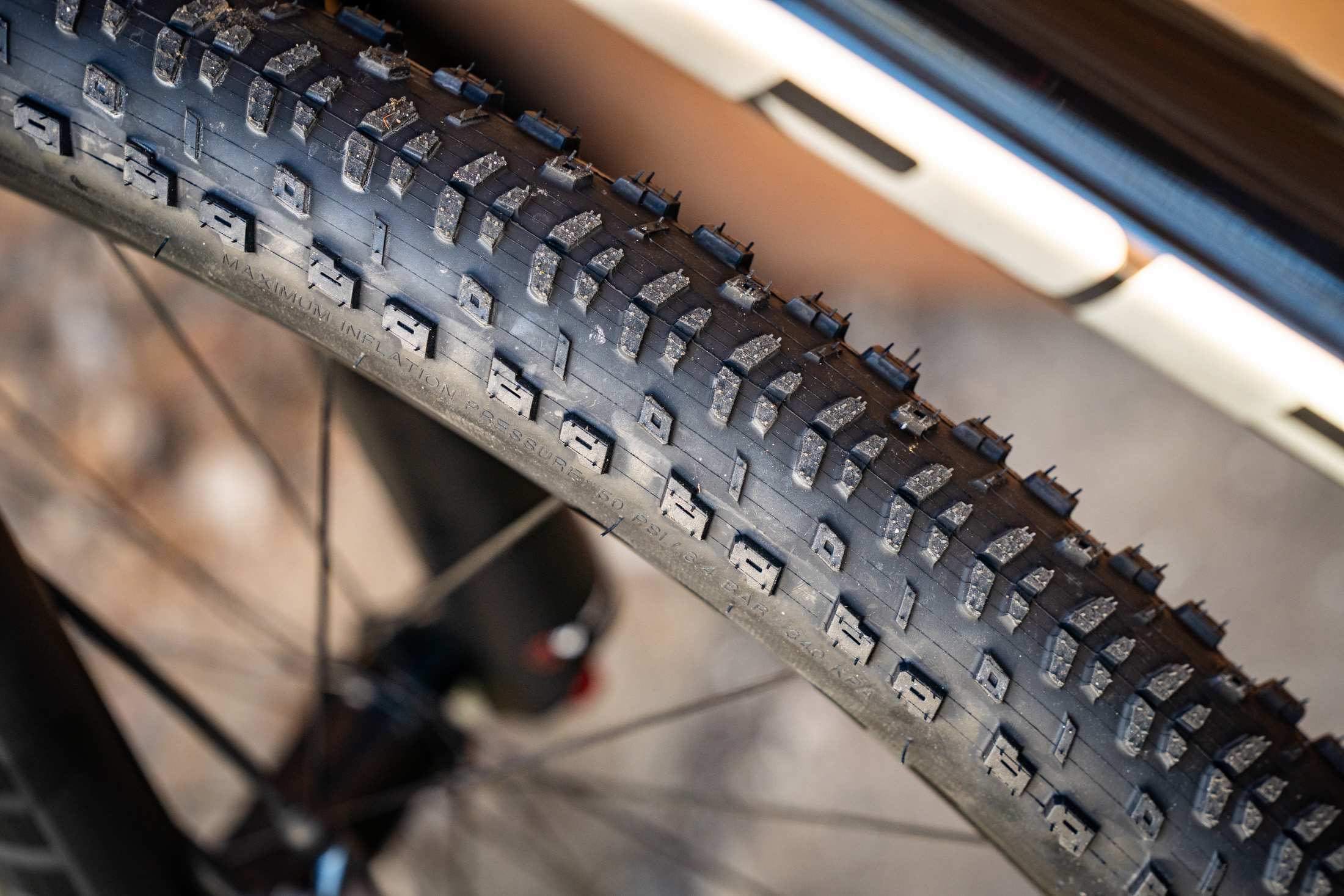Wil reviews the 2024 Trek Supercaliber
The Trek Supercaliber debuted in 2019 as a short travel XC bike built around the distinctive IsoStrut suspension design. Bred for racing at the very highest level of the sport, the Supercaliber has earned plenty of success including multiple World Cup, World Championship and Olympic victories. Four years is a long time in the XC world however, and the platform was no doubt due for a makeover.
To bring things up to date Trek recently unveiled the second generation Supercaliber. Although it appears to be a spitting image of its predecessor, a closer look reveals two new carbon frames, key geometry updates, an increase in travel and a redesigned IsoStrut shock made by RockShox.
So how do all those changes play out on the trail? How different is it to the original model? And how does it compare to the best XC bikes on the market? We got our hands on the 2024 Trek Supercaliber to find out!
Watch our video review of the Trek Supercaliber here:
Despite the improved suspension performance, it’s clear that the new Supercaliber has lost none of its ruthless efficiency.

An overview of the 2024 Trek Supercaliber
The 2024 Trek Supercaliber remains as the US brand’s flagship full suspension race bike that’s designed to compete with fellow XC speedsters like the Scott Spark RC, Specialized Epic World Cup, and Giant Anthem.
It still features the distinctive IsoStrut suspension platform, though rear travel has increased from 60mm to 80mm. Fork travel has also bumped up to 110mm. However, the frame will handle a 100-120mm travel fork for those looking to tune the geometry and handling.

The OCLV carbon frame is all-new, and it’s now produced in two tiers; SL and SLR. They share an identical swingarm, but feature different front triangles. The SLR version incorporates higher modulus fibres, and it also uses conventional internal cable routing with foam insulation tubes to prevent rattling. In comparison, the SL frame features moulded-in guide tubes to make cable routing easier, at the expense of some added weight.
On that note, we’re glad to see Trek bucking the trend for routing the cables through the headset. Keeping things simple, the Knock Block steering limiter is also gone.
The Supercaliber does retain its 92mm wide PF92 bottom bracket shell, though an update to the new-school 55mm chainline has allowed the engineers to build in more tyre clearance. And aside from the top-end model, each Supercaliber now comes standard with 2.4in wide tyres. There’s also a new floating rear brake mount that’s designed specifically for 160mm rotors.
There’s a new IsoStrut
While the IsoStrut suspension design carries over to the new Trek Supercaliber, the shock itself is all-new. It’s now manufactured in partnership with RockShox, and it’s based on the latest SIDLuxe shock.
The available adjustments remain the same with an external rebound dial, air valve and a two-position remote lockout. However, the stroke has increased from 32.5mm to 40mm to help deliver the extra rear travel. Trek says the leverage rate is higher and flatter, with the goal of improving small-bump sensitivity and grip. Furthermore, the shock damper incorporates a bigger piston to improve oil flow and reduce choking on high-speed impacts.
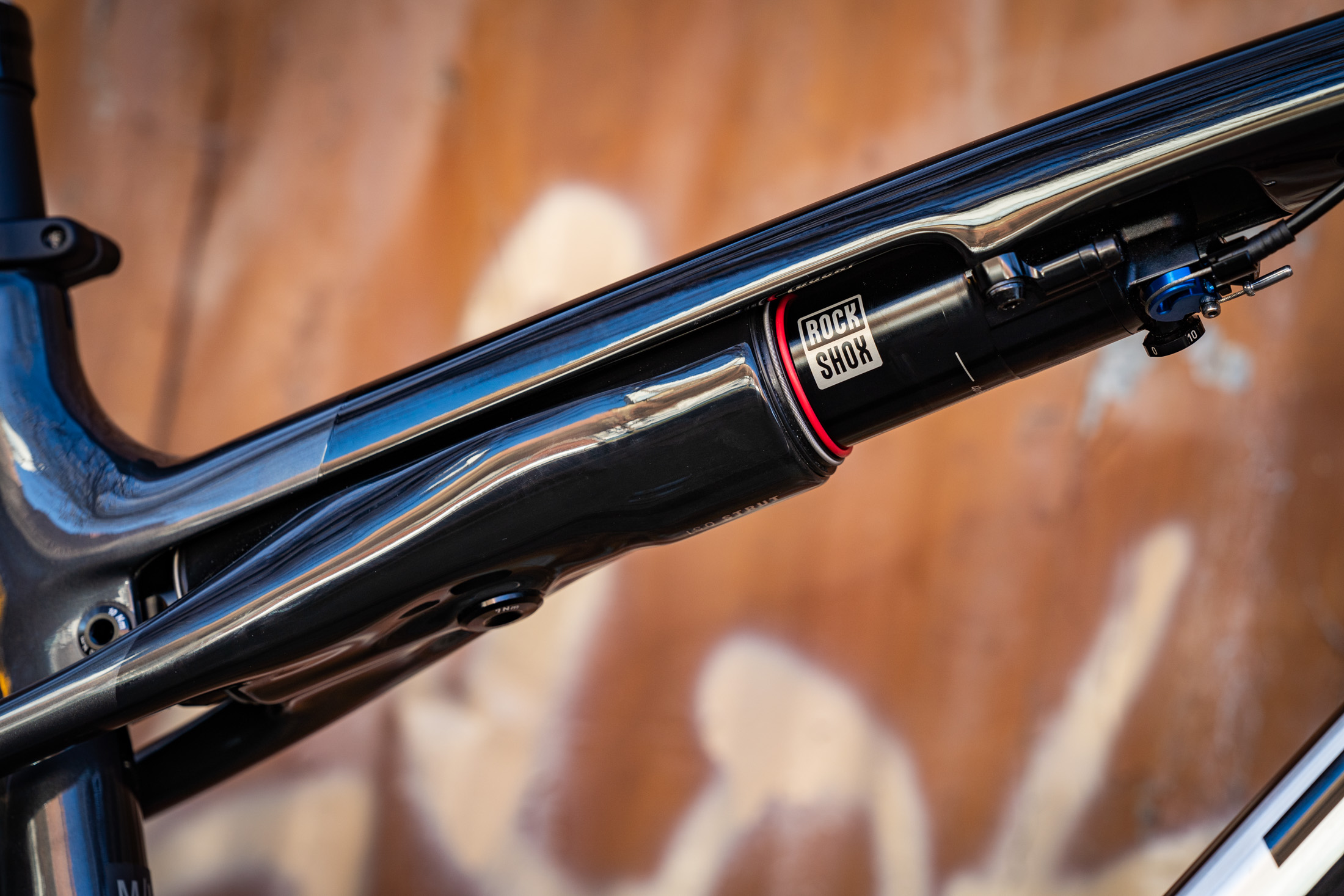
The IsoStrut stanchion has also grown in diameter to 38mm, which is said to improve rear wheel tracking and elevate the frame’s overall torsional stiffness. It now gets anodised sag gradients to make setup easier, and the head of the shock only needs a 4mm hex key to open it up for servicing, compared to the Race Face BB tool that was required for the old bike.
Even with the extra travel there’s still a keen focus on efficiency. Trek has moved the main pivot 10mm upwards to increase anti-squat and better resist suspension bob under pedalling inputs. It also means you can fit a larger chainring (up to a 38T) without sacrificing the Supercaliber’s snappy pedalling performance.

Trek Supercaliber frame weight
As mentioned earlier, the 2024 Trek Supercaliber frame is offered in both SL and SLR variants. The SLR frame is claimed to weigh 1,950g including the shock, while the SL frame comes in at 2,100g.
Now although Trek says the new SLR frame is lighter than its predecessor, that isn’t entirely true. It’s worth noting that when the Supercaliber first launched in 2019 it actually boasted a claimed frame weight of 1,933g. Curiously that figure has grown over the years and is now listed as 2,150g.
We asked Trek about this increase, and the response was that it was due to a rolling change in 2021 that saw a heavier swingarm developed for UDH compatibility. It’s unclear how a UDH dropout could result in a 217g weight increase, so perhaps there were other reasons behind the swingarm getting heavier.

Comparisons to the old bike aside, here’s how the new Supercaliber SLR frame compares to the claimed weights of some of its competitors;
- Specialized S-Works Epic EVO – 1,659g
- Specialized S-Works Epic World Cup – 1,712g
- Giant Anthem Advanced Pro – 1,735g
- Orbea Oiz OMX – 1,798g
- Scott Spark HMX SL – 1,870g
- Canyon Lux World Cup CFR – 1,894g
- Cannondale Scalpel Hi-Mod – 1,910g
- Santa Cruz Blur 4 – 1,933g
- Trek Supercaliber SLR – 1,950g
- Merida Ninety-Six RC – 2,064g
- Trek Supercaliber SL – 2,100g

Geometry updates
There have also been some noteworthy updates to the geometry on the 2024 Trek Supercaliber.
The 67.5° head angle is quite a bit slacker than the old bike, and the reach has grown by 10-15mm across the five frame sizes. Along with a 5mm increase in chainstay length, the overall wheelbase is considerably longer.
Trek has also steepened the seat angle by half a degree and lifted the BB height by 7mm. The aim was to improve the Supercaliber’s technical climbing performance, while also factoring in the change in dynamic ride height due to the increased suspension travel.
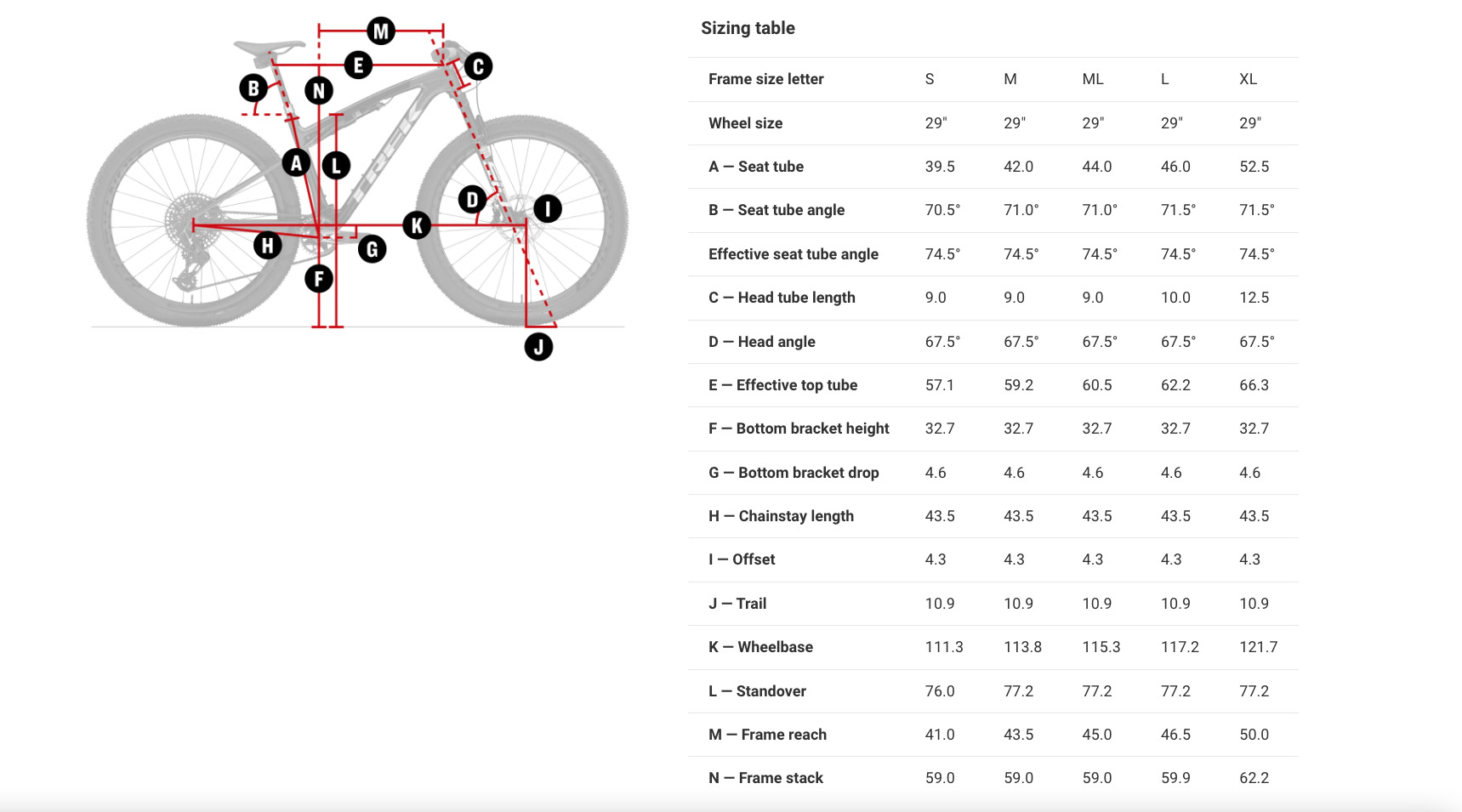

Trek Supercaliber price & specs
There will be six Trek Supercaliber models available in Australia, with prices starting from $8,999 AUD for the Supercaliber SL 9.7 AXS.
Most of the higher-end models will only be available through the Project One custom bike builder, which allows you to choose from a range of paint jobs and specification options. You can see the detailed specs and prices of the full range at the bottom of this review.
Our test bike sits in the middle of the lineup, and we expect it’ll be one of the most popular options; it’s the Trek Supercaliber SLR 9.8 GX AXS, and the current price on this is $11,999 AUD.

2024 Trek Supercaliber SLR 9.8 GX AXS
- Frame | SLR OCLV Mountain Carbon, IsoStrut Suspension Design, 80mm Travel
- Fork | RockShox SID, Rush RL Damper w/Lockout, 44mm Offset, 110mm Travel
- Shock | RockShox SIDLuxe IsoStrut w/Lockout, 240x40mm
- Wheels | Bontrager Kovee Elite, Carbon Rims, 29mm Inner Width
- Tyres | Bontrager Sainte-Anne RSL XR, 2.4in Front & Rear
- Drivetrain | SRAM GX Eagle AXS Transmission 1×12 w/34T Crankset & 10-52T Cassette
- Brakes | SRAM Level Bronze 4-Piston w/180mm Front & 160mm Rear Rotors
- Cockpit | Bontrager RSL Integrated Bar & Stem, OCLV Carbon, 750mm Width
- Seatpost | Bontrager Line Dropper, 31.6mm Diameter, Travel: 100mm (S), 125mm (M-ML), 150mm (L-XL)
- Saddle | Bonrager Verse Elite, Austentite Rails
- Confirmed Weight | 11.62kg
- RRP | $11,999 AUD

The increased travel and flatter leverage rate offers noticeably improved sensitivity over its predecessor, and indeed the back end is smoother than you’d expect for an XC bike with just 80mm of travel.

Trek Supercaliber sizing & fit
At 175cm tall I have the option of riding either the M or ML size in the Trek Supercaliber. The stack is identical between the two, with the key difference being the reach (435mm vs 450mm). Most of the XC bikes I’ve been testing lately have been in the 440-450mm zone, so I elected for the ML size.
The riding position is stretched-out, aggressive and racy. Your weight is pushed low and forward thanks to the short head tube and negative rise 70mm stem. You feel very much in-the-bike, with the Supercaliber hovering close to the ground.
While the fit is good, I can’t say I’m totally gelling with the cockpit ergonomics. There’s a limited range of adjustment for the lever reach on the SRAM Level Bronze brakes, and even with the dial wound all the way in they’re still not quite as close to the grips as I’d like.
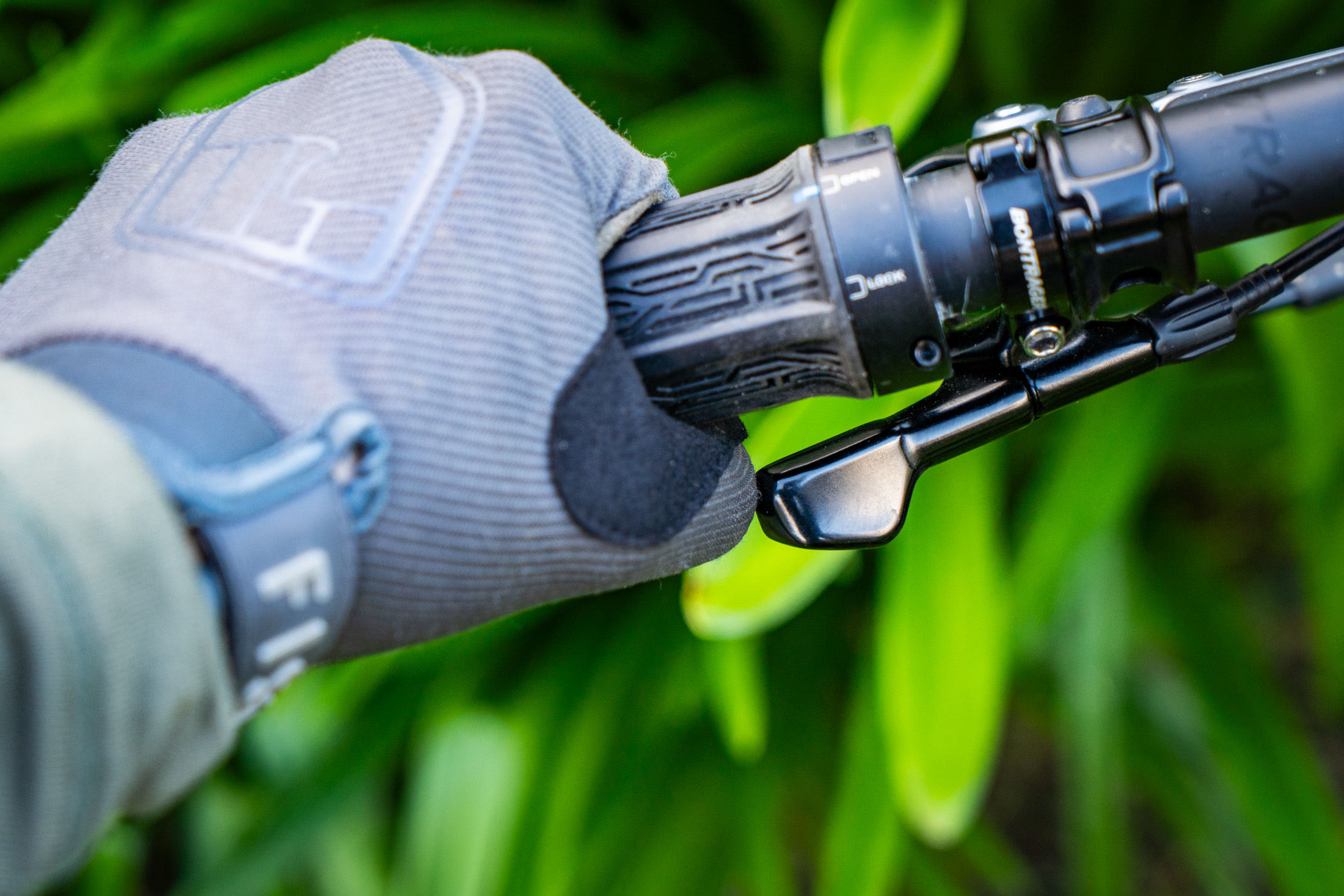
Our test bike comes standard with the cheap version of Bontrager’s dropper remote that features a standalone bar clamp. It really only fits in between the TwistLoc remote and the brake lever clamp, and that means the paddle sits quite far outboard. Not only does it push into the knuckle of my thumb, it also makes it difficult to grab a hold of the TwistLoc remote to actuate.
High-end Supercaliber models get a dropper remote that mounts directly to the brake lever, which would help to alleviate this clearance issue.
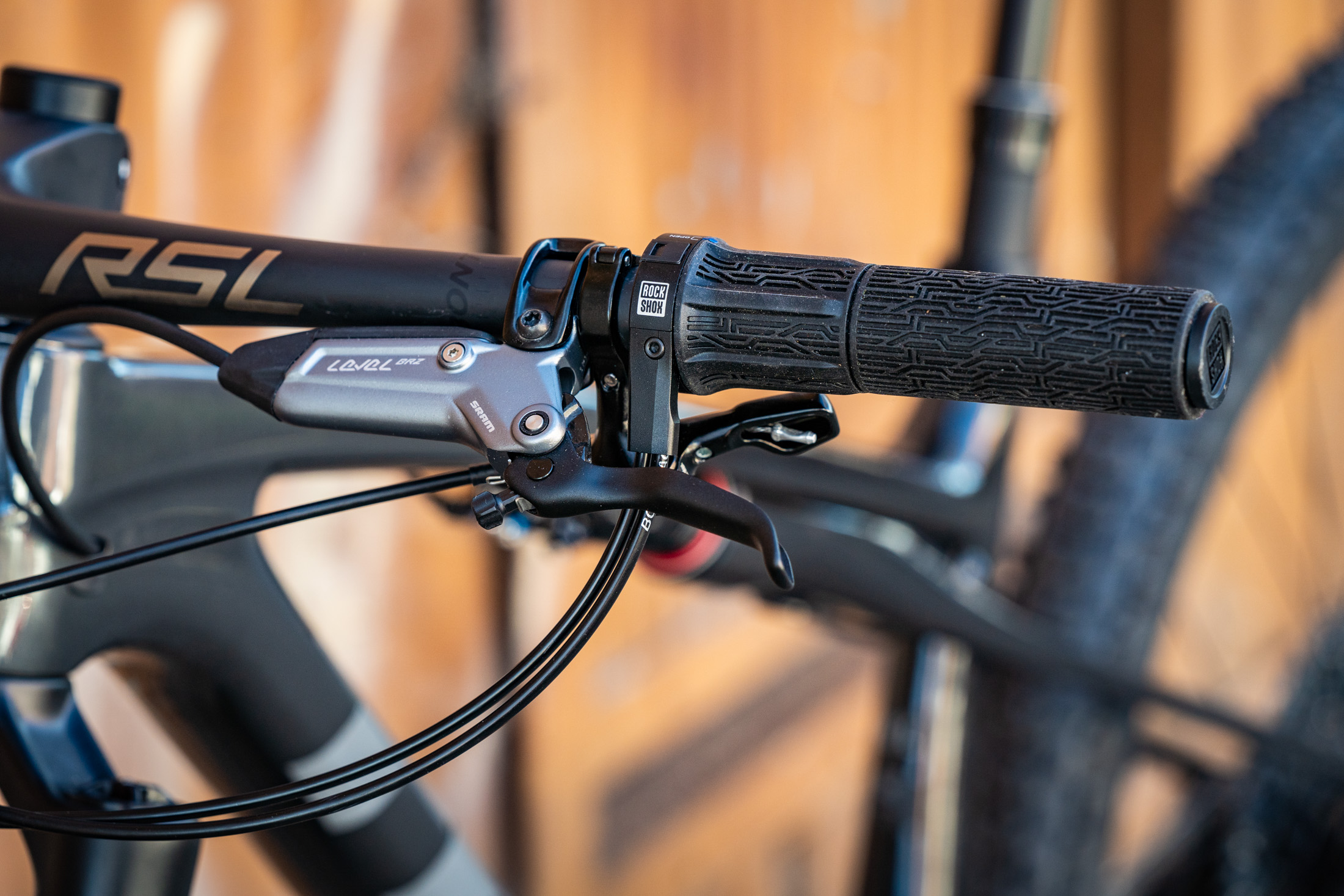
As we’ve experienced with the 2024 RockShox SID, the new TwistLoc Ultimate remote works well. However, for some reason our test bike came with the straight cable guide that spits the cables out perpendicular to the handlebar, which makes for an unsightly mess of cables. The angled cable guide would certainly make more sense here.
Suspension setup
Setting up the suspension on the new Trek Supercaliber has been made significantly easier thanks to the anodised sag gradients on the IsoStrut stanchion. Trek says you run the shock with 20-30% sag depending on the feel you’re after. I ended up at 25% sag, with 116psi to support my 67kg riding weight. I’ve set rebound damping on the quicker side at just three clicks off the fastest setting (7/10 clicks).

It’s also possible to tune the shock’s progression with volume spacers, and two are included in the box with the bike. It’s not a straightforward process however, as you’ll need to remove the IsoStrut assembly from the frame in order to open up the shock and access the air spring.
Up front is the new 2024 RockShox SID. It’s the base model with the Rush RL damper, though it features the same chassis and DebonAir+ spring as the top-end Ultimate model that I’ve been testing recently. As with the Ultimate model, I’ve found the suggested pressures via the RockShox Trailhead app to be too low. Instead of the recommended 69psi I’m running 82psi, and I have the rebound damping set nine clicks out from the slowest setting (9/22 clicks).
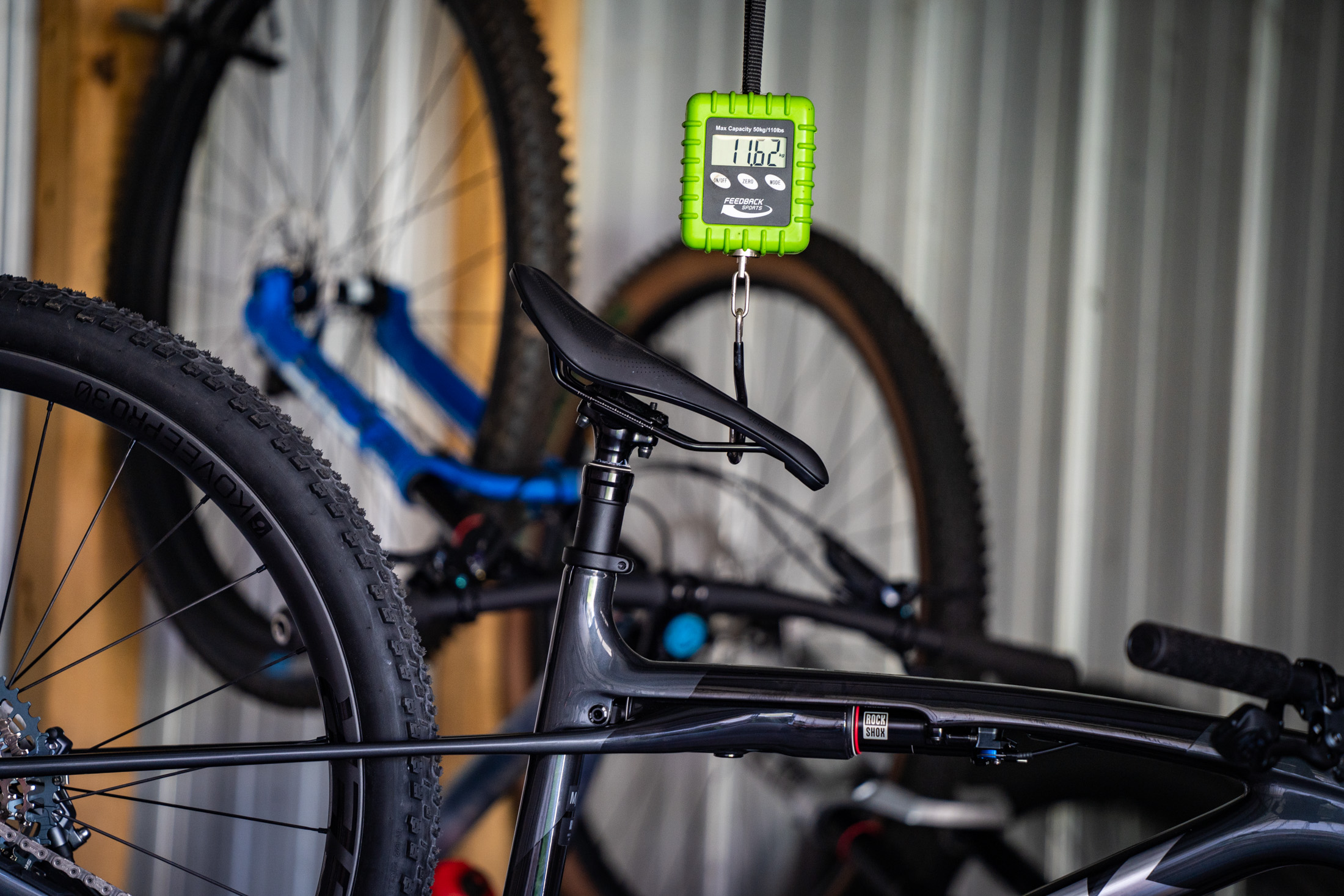
Trek Supercaliber weight
With the tyres set up tubeless our Trek Supercaliber SLR 9.8 GX AXS test bike came in at a confirmed weight of 11.62kg. That’s higher than the claimed weight of 11.28kg, and it’s also on the heavier side for a premium XC race bike with a $12K price tag.
As with all Supercaliber models, it does come fitted with a dropper post, which is fantastic to see. The Bontrager Line dropper is relatively heavy at 554g (confirmed), so you could drop 200g alone by upgrading to a Fox Transfer SL.
It’s worth noting that the Bontrager Kovee Pro wheelset is the older version with heavier rims and a deeper profile. These came in at a confirmed weight of 1,757g including the pre-fitted TLR rim strips and valves. That’s reasonable, though nowhere near the jaw-dropping 1,217g weight of the Kovee RSL wheelset we recently reviewed.
I suspect this obscenely tight fit is due to the combination the thick plastic TLR rim strips and the tyres themselves, but whatever the case, it’s not good.

Super-tight tyres
We’re glad to see Trek including a bottle of sealant with the bike, which makes it easy to set the tyres up tubeless.
Speaking of, these are the new Bontrager Sainte-Anne tyres that’ll be replacing the outgoing XR2. With a tread pattern that’s reminiscent of a Schwalbe Racing Ralph, they feature a finely-woven 220tpi casing, sidewall protection, dual compound rubber and a generous 2.4in width.
During the initial build I discovered that the tyres on our test bike appeared to be welded onto the rims, and found it impossible to physically pop the bead with my bare hands. With the help of a friend, a vice and some choice vocabulary, we eventually managed to peel the tyres off the rims. I suspect this obscenely tight fit is due to the combination the thick plastic TLR rim strips and the tyres themselves, but whatever the case, it’s not good.
Once I removed the tyres I was able to weigh them (798g confirmed) before fitting a tubeless insert into the rear wheel. I aired them up to 22psi up front and 24psi out back and rolled towards the trailhead, desperately praying I wouldn’t suffer any punctures.

Servicing the IsoStrut
Having spent a load of time on the previous generation Trek Supercaliber, I was very excited to see how the new bike would compare. However, I have to admit that I wasn’t totally loving it during the first few rides. The claims of improved sensitivity weren’t exactly playing out on the trail, with the back end feeling somewhat harsh.
This wasn’t a total surprise as the IsoStrut assembly does require some trail time to bed in, though out of curiosity I decided to pull it apart to get a closer look at the innards and see how different it was to the old bike.
Straight away the back end of the Supercaliber felt better, and it gradually became smoother and more sensitive over the course of the next few rides.

It’s worth noting here that the 38mm stanchion is essentially one half of a RockShox Zeb. In fact, the IsoStrut uses exactly the same bushings and wiper seals as the big-hitting single crown fork. That’s pretty cool, and it should make it easier to source replacements when needed.
For those wondering, the IsoStrut weighs in at 369g on the workshop scales, which is about 100g heavier than a conventional SIDLuxe shock. Bear in mind that it’s also a structural member of the frame, so it’s not exactly an apples-to-apples comparison.
With the IsoStrut cracked open I discovered that while it wasn’t totally bone-dry inside, there wasn’t a lot of lubrication fluid present. I gave it all a clean and pumped in 15cc of the requisite Maxima Plush suspension fluid and bolted everything back together.
Straight away the back end of the Supercaliber felt better, and it gradually became smoother and more sensitive over the course of the next few rides. Now with over 250km of testing logged, I’m confident to give a detailed appraisal of the bike.

What do we dig about the 2024 Trek Supercaliber?
With the IsoStrut dialled in, the Trek Supercaliber has been getting better the more I’ve ridden it.
The increased travel and flatter leverage rate offers noticeably improved sensitivity over its predecessor, and indeed the back end is smoother than you’d expect for an XC bike with just 80mm of travel. Seated comfort is excellent, and the rear suspension generates usable grip whether you’re in or out of the saddle.
Of course it’s not as plush as the longer travel Spark or Oiz. In direct comparison, the IsoStrut platform delivers a feel that’s closer to those two bikes when their suspension remotes are set to the middle setting (Traction Control or Medium).

However, for most XC racer types the Supercaliber will be sufficiently comfortable, and it’s obviously way more compliant than a hardtail. The high volume tyres also allow for lower pressures and more cushioning across sharp edges, and the 110mm travel SID keeps the front end tracking smoothly. The bigger chassis is a great match for the sturdy Supercaliber, offering a considerably more planted ride quality over the skinnier 32mm forks that came standard on the old bike.
Being able to drop the saddle down for the descents also makes a huge difference to descending confidence. Combined with the slacker head angle and longer wheelbase, the new Supercaliber is a far more stable bike at speed.

Stompable efficiency
Despite the improved suspension performance, it’s clear that the Supercaliber has lost none of its ruthless efficiency. Indeed the lockout is somewhat superfluous on this bike, which is good because I couldn’t really activate the TwistLoc remote anyway due to the poor placement of the dropper lever.
Really the only reason you’d reach for it in the first place would be to stabilise the fork during out-of-the-saddle sprinting. Otherwise you can comfortably leave the suspension open all the time with no concern for losing precious watts to pedal bob.

As for the source of the Supercaliber’s impressive efficiency, that comes down to a combination of the frame’s kinematics and the shock’s damper tune. We’re told that the compression damping in the Open setting is actually the same as the middle setting on a regular SIDLuxe 3-position shock, which makes sense as it’s very steady under pedalling inputs. Combined with the linear leverage rate and increased anti-squat, there’s zero hint of wallow through the rear end.
This makes the Supercaliber incredibly responsive under power, and it really encourages you to attack the trail at any opportunity. There’s minimal flex between the handlebar and the rear axle, which helps to translate explosive efforts when you’re yanking on the grips and stomping on the pedals. It lights up technical climbs, with the slightly taller BB height offering decent ground clearance over technical features.

Razor-sharp rigidity
Indeed it’s the overall chassis stiffness that represents one of the main drivers behind the IsoStrut platform. With the big 38mm stanchion braced by two widely-spaced bushings, Trek’s engineers have been able to minimise rear-end flex compared to a frame with a traditional swing link. This gives the Supercaliber a near-hardtail level of rigidity, with a sharp and agile feel when darting through the corners.
Trek has bolstered this with the stiff carbon wheels and RSL one-piece cockpit, so while the slacker head angle has calmed down the steering somewhat, the handling is still positively telepathic compared to most other XC bikes. Steering inputs are transmitted with minimal lag, and I found myself subconsciously taking the inside lines whenever possible.
There’s a real sense of what the terrain is doing beneath you thanks to the direct line of communication between your contact points and the tyre contact patches. This lack of vagueness is particularly beneficial across softer trail surfaces and through dusty berms, where you can modulate your weight distribution to maximise grip.

What has it struggled with?
While it is smoother and more stable than predecessor, the Trek Supercaliber doesn’t offer the same level of big-hit confidence on the descents as the Spark and Oiz. It’s surprisingly well controlled thanks to its sturdy chassis and nicely balanced geometry, but you can still run out of travel when pushing hard on rocky terrain.
There isn’t a tonne of support from the rear suspension, and that means it’s possible to bottom it out on bigger and harder landings. The sensation was initially quite harsh and metallic-y, though hitting full travel did become notably quieter and more damped after servicing the IsoStrut with fresh oil. It still makes a bit of noise when fully bottoming out, which seems to be amplified by the hollow stanchion.

With this in mind, I’d suggest heavier riders and anyone who’s wishing to run more than 25% sag will need to add a volume spacer to increase ramp-up. In my case, I found the stock setup worked fine as long as I exercised a little nuance and chose smoother lines as I would on a hardtail.
Even still, the Supercaliber exhibits noticeable feedback through the drivetrain across high-frequency chatter. This is the downside of the higher main pivot, which results in increased pedal kickback that is particularly noticeable on rocky tech climbs.
You could mellow out this sensation by fitting a larger chainring. This would reduce the amount of chain growth that occurs as the shock goes through its travel, potentially leading to a smoother ride quality.

Component highs & lows
It has to be said that for the $11,999 AUD asking price, our Trek Supercaliber SLR 9.8 GX AXS test bike doesn’t represent amazing value for money. It costs the same as the Cervelo ZFS-5 I’m currently testing, yet that bike comes with a SRAM X0 Transmission and a Reverb AXS dropper post. And the Orbea Oiz M10 I reviewed recently is $2,500 AUD cheaper despite having Factory Series Fox suspension and a nicer wheelset.
This would suggest that it’s the gorgeous SLR carbon frame and efficient IsoStrut suspension that you’re mostly paying for here. It’s also worth highlighting the trick Bontrager RSL one-piece cockpit, which sells for $640 AUD on its own and weighs just 239g.
While not overly blingy, the rest of the component package on our test bike has worked pretty well. The SRAM GX Transmission isn’t as light as its pricier X0 and XX siblings, but the gear range and shifting accuracy is superb. And although the Level brakes weren’t totally quiet, they otherwise offer excellent power and feel.
The Kovee Pro wheels have been solid, though as a lighter rider I didn’t find the stiff carbon rims to offer much compliance on rocky trails. I confirmed this by testing out the Supercaliber with the Kovee RSL wheelset, which made a noticeable difference to the overall ride quality. The stock wheels are very direct though, and the buzzy 108pt engagement offers rapid pickup at the pedals. The freehub is already starting to show some signs of contamination, so you’ll want to keep on top of maintenance to avoid premature bearing wear.
As for the overly tight-fitting tyres, I was mighty thankful not to have encountered any punctures throughout testing. If this were my bike, I’d be replacing the plastic TLR rim strips and fitting standard tubeless tape.

While not a big issue in terms of performance, the rear tyre has had a hefty wobble in the casing from new, which is a bit disappointing from a quality control perspective. I was otherwise happy to see the Sainte-Anne tyres measuring up exactly as claimed at 2.4in wide, and I found them to roll really well while offering predictable grip on dry and dusty hardpacked trails. The rubber compound lacks some grip on wet rocks and roots, which caused me a couple of pant-shitting moments when the wheels were spat out sideways.
Frame details
One positive I noticed during a particularly muddy test ride was the insane amount of clearance through the rear of the frame. Unlike most full suspension designs, the chainstay bridge on the Trek Supercaliber sits in front of the seat tube. This significantly reduces mud build-up, which is something you’ll be thankful for when the weather conditions turn south on race day.

As mentioned earlier, I’ve not been stoked on the cockpit ergonomics or cable management. Our test bike has exhibited some cable noise from inside the frame, and the bird’s nest in front of the handlebars spoils the otherwise clean lines of the IsoStrut platform.
It is nice to see the Supercaliber equipped with a conventional headset, though I do miss the Knock Block steering limiter. On our M/L size test bike, the dropper post lever and right-hand controller are able to contact the top tube when the bar spins around, which could cause some unfortunate damage in the event of a crash.
In terms of general maintenance, RockShox recommends servicing the IsoStrut air can every 100 hours of ride time, which is actually double the interval for a regular SIDLuxe shock. Given our experience however, I’d suggest checking the lubrication levels if you’re experiencing any harshness from new. Our test bike came out of Trek Australia’s production stock, so there’s a chance there could be consumer bikes out there in a similar condition.
Servicing is a relatively easy process to undertake, and I like how the IsoStrut combines existing components from the Zeb fork and SIDLuxe shock. I was also glad to see all of the bolts and mounting points lining up neatly, and there was no bending or preloading required to get the swingarm back into place. Of note is the new main pivot, which now uses a collet axle with a conical wedge to keep everything snug and secure.

Trek Supercaliber vs Specialized Epic World Cup
When it comes to comparisons to the Trek Supercaliber, none are more apt than the Specialized Epic World Cup.
Launched earlier this year, the Epic World Cup features a similar profile with its rear shock partially hidden within the frame’s top tube. Equipped with 75mm of rear travel, the Epic World Cup also utilises a custom shock that’s manufactured by RockShox. It’s called the SIDLuxe WCID and it uses a unique, tuneable air-spring to deliver an automated pedalling platform. Combined with the fork’s Brain damper, the Epic World Cup is defined by its lack of remote lockouts and excess cables. The result is a remarkably clean cockpit that is quite the juxtaposition to the Supercaliber.
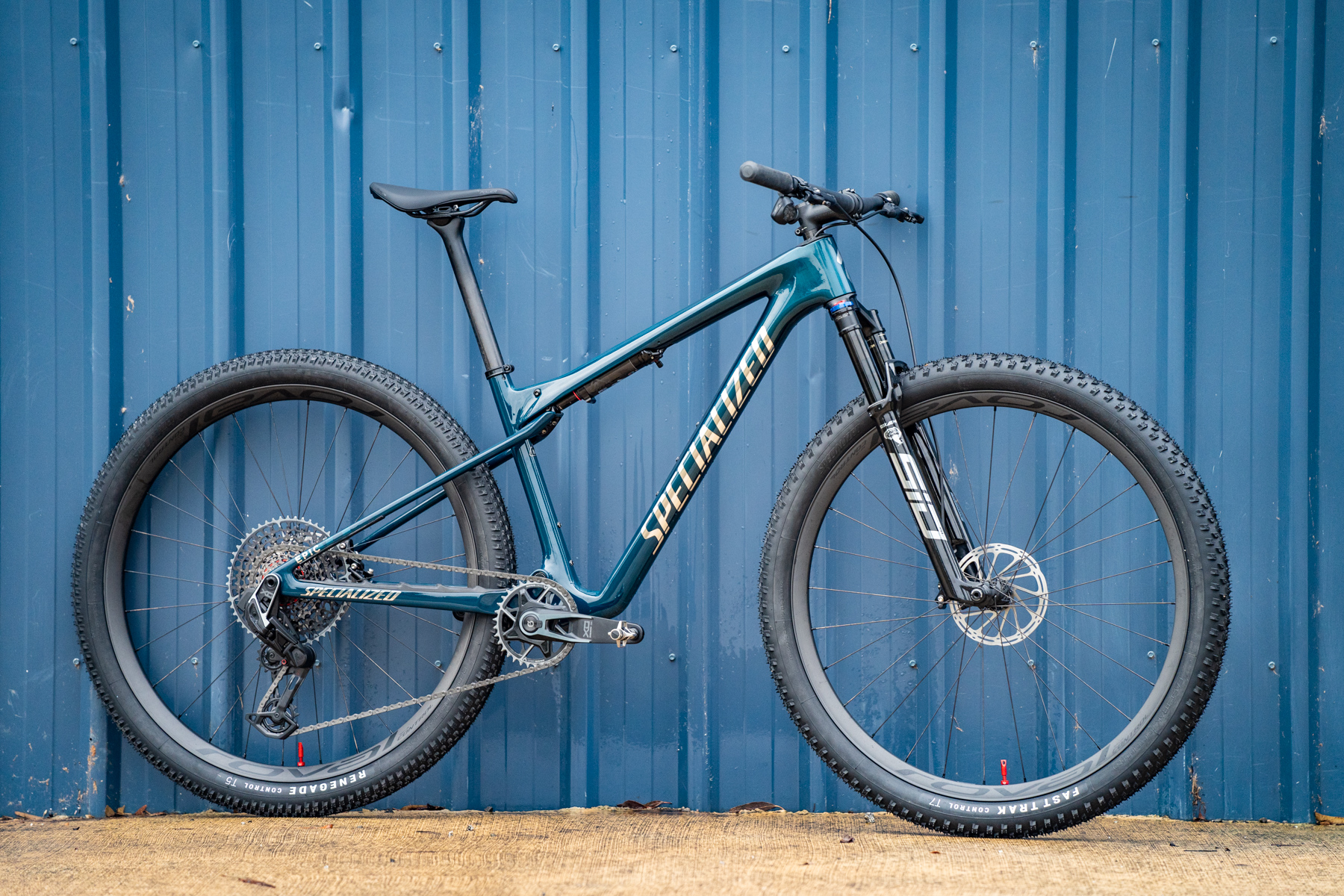
As for pricing, the Specialized Epic World Cup Pro we tested sells for $13,900 AUD. It gets a considerably better spec with a RockShox SID SL Ultimate fork, a SRAM X0 Transmission, a powermeter, Level Silver brakes, and a Roval Control Carbon wheelset. Unfortunately it doesn’t come standard with a dropper post, but overall it feels like a more refined package out of the box.
It also comes in quite a bit lighter at 10.32kg. Even if you did add a Reverb AXS dropper, it’d still be close to a kilo lighter overall.
While we’re talking weight, the Epic World Cup’s FACT 12m carbon frame is claimed to be over 200g lighter than the Supercaliber SLR (1,712g vs 1,950g). There are some other differences, with the Epic World Cup featuring a threaded BB shell and internal routing through the headset.
Out on the trail, both bikes offer incredible pedalling performance. They share a similar ethos with no need to adjust levers or toggle remotes, encouraging you to hammer away on the pedals and focus on the trail ahead. It’s quite a different experience to the Scott Spark for example, which is very much reliant on its TwinLoc remote.
Thanks to the WCID shock and its tuneable negative air spring, there’s considerable scope for dialling in the rear suspension on the Epic World Cup. In the ‘Active’ setting the rear suspension isn’t as efficient but it is smoother than the Supercaliber. There’s greater support with a stronger ramp-up towards the end of the travel, while the lower anti-squat results in a more neutral feel through the pedals over chunky terrain.
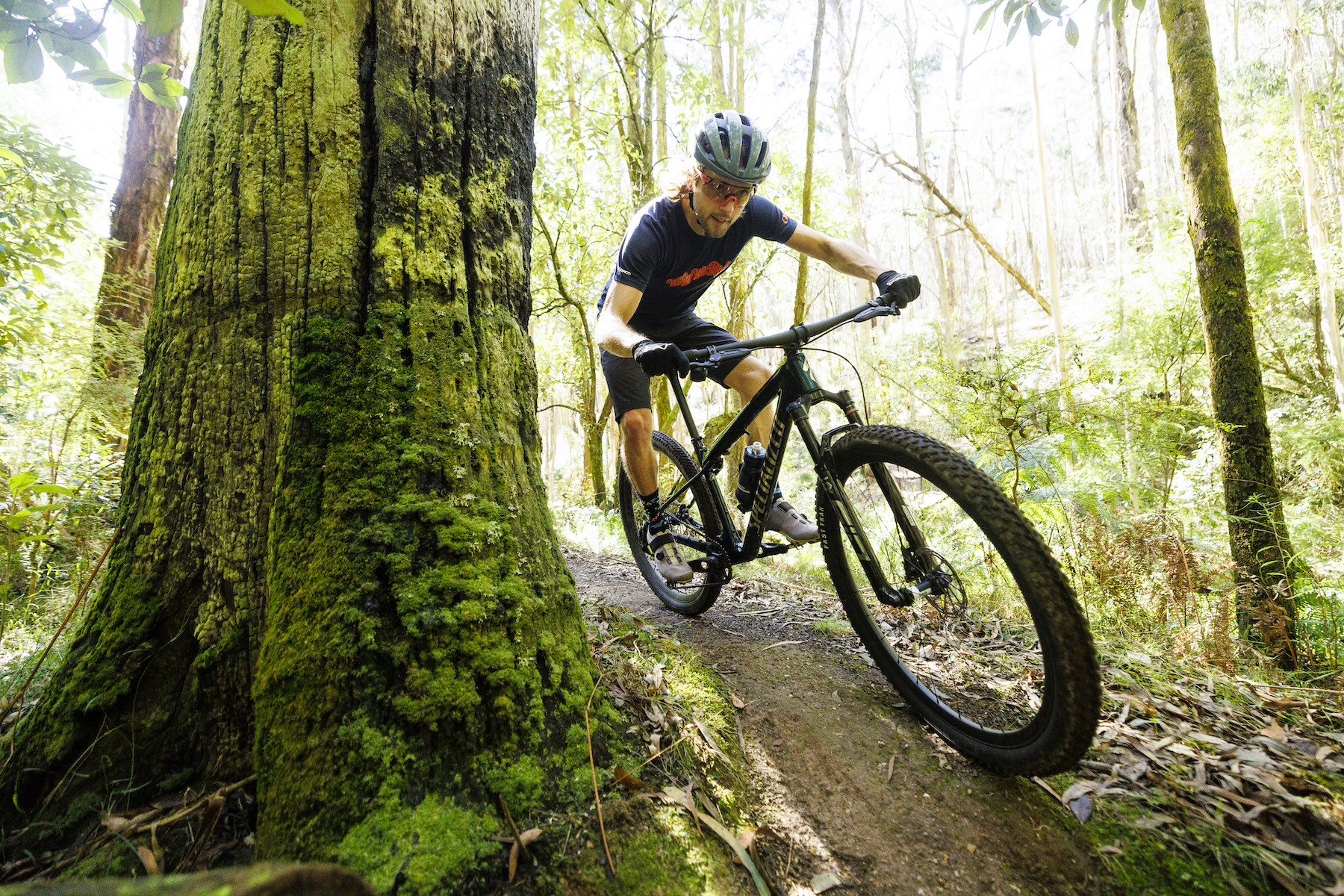
Furthermore, the Epic World Cup features a slacker head angle (66.5° vs 67.5°) and more BB drop (57mm vs 46mm), which results in improved stability and confidence on the descents. The Brain-equipped SID SL fork isn’t overly supple, and you need to be riding fast and assertively to get the most out of the inertia valve. The upside is that it doesn’t bob much at all when you’re sprinting, and it provides awesome stability on high-speed flow trails, staying high in its travel through berms and rollers.
For smoother race courses, setting up the WCID shock in the ‘Firm’ setting delivers an almost locked-out hardtail feel. In this setting the Epic World Cup is a touch more efficient than the Supercaliber, but it does lack some small-bump compliance.
Given the adjustability that’s on offer, the Epic World Cup requires a decent amount of trail time to experiment with the available settings in order to find your preferred setup. Of course there is no way to adjust the settings on-the-fly, and the lack of a remote lockout may be a turnoff for some racers. For others, the automated platform and clutter-free cockpit will be more than worth it.
In comparison, the Supercaliber is a simpler and more focused beast. Once you’ve dialled in your shock sag and rebound, there’s not much more to worry about. Pedalling performance is always ultra-snappy, and you’ve got access to a proper full lockout when needed. While the back end isn’t as supportive on bigger hits or as compliant on rockier terrain as the Epic World Cup, it does deliver excellent climbing grip and seated comfort. Along with the taut carbon frame, higher BB and steeper head angle, it’s more responsive through the turns and it’s arguably the better climber out of the two.

Flow’s Verdict
With its new frame, updated geometry and redesigned IsoStrut, the 2024 Trek Supercaliber is a welcome evolution of the original.
Some folks may be disappointed that it doesn’t look all that different, and for sure it isn’t a radical departure from its predecessor. It’s still sharp, efficient and highly responsive on tight singletrack, making it well suited to racing dirt crits and short track XC.
The suspension is notably improved however, offering better grip and small-bump sensitivity. Along with the bigger fork, dropper post and 2.4in tyres, the new Supercaliber exudes more confidence on the descents and greater stability at speed.
It isn’t exactly a flawless package though, and we’ve not been blown away by its weight or value for money. It’s also not as plush or as supportive as some of its longer travel contemporaries, and that makes it less versatile outside of the race tape, especially on rockier terrain.
If you’re serious about XC racing and you value efficiency above all else however, you’re unlikely to find a more focussed bike than the Supercaliber. It does a marvellous job of straddling the performance gap between a hardtail and a traditional full suspension bike, offering razor-sharp handling and crisp pedalling performance with just enough travel to get you out of trouble when needed.


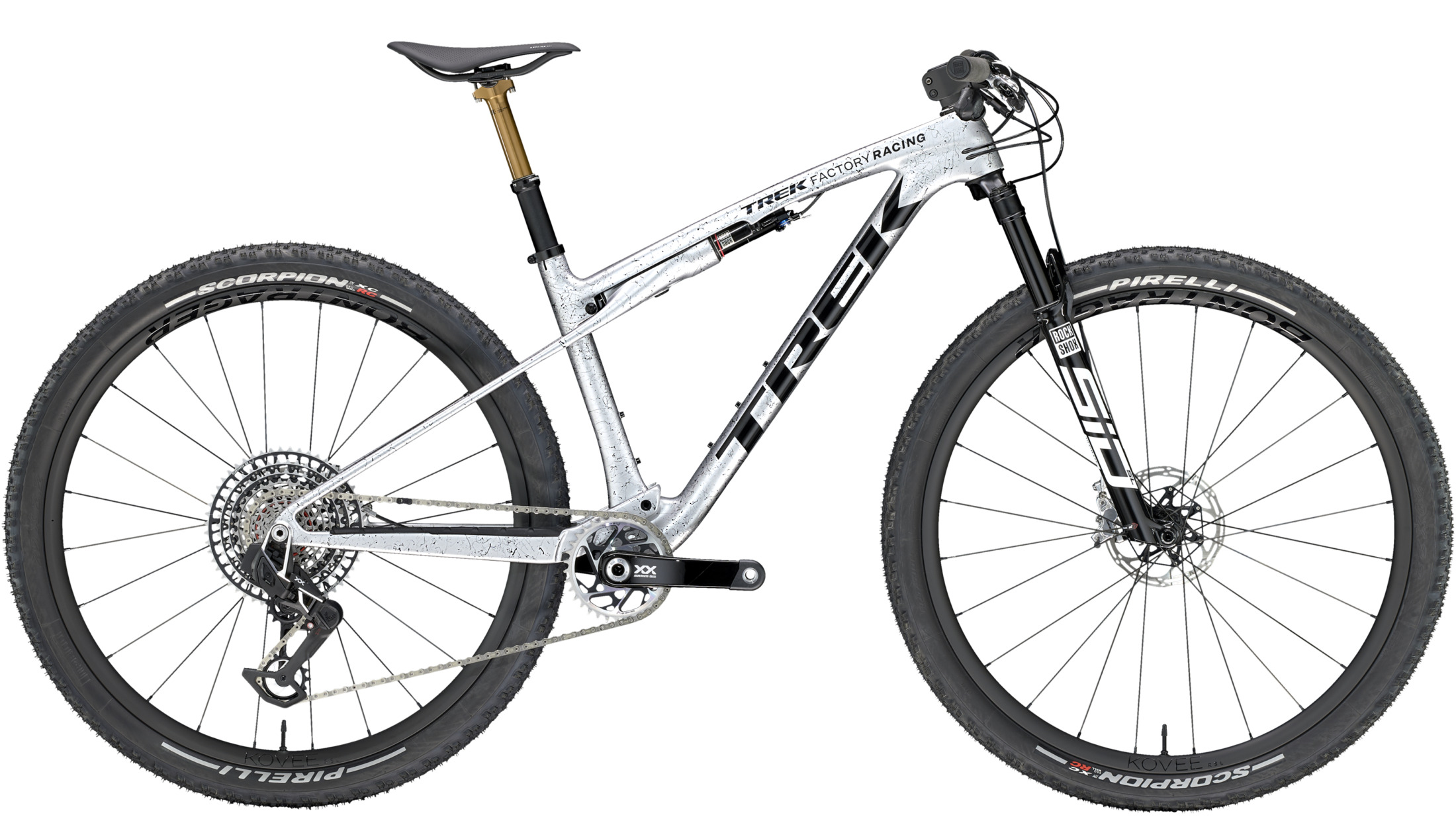
2024 Trek Supercaliber SLR 9.9 XX AXS
- Frame | SLR OCLV Mountain Carbon, IsoStrut Suspension Design, 80mm Travel
- Fork | RockShox SID SL Ultimate, Charger Race Day Damper w/Lockout, 44mm Offset, 110mm Travel
- Shock | RockShox SIDLuxe IsoStrut w/Lockout, 240x40mm
- Wheels | Bontrager Kovee RSL, Carbon Rims, 29mm Inner Width
- Tyres | Bontrager Sainte-Anne RSL XR, 2.2in Front & Rear
- Drivetrain | SRAM XX SL Eagle AXS Transmission 1×12 w/34T Crankset & 10-52T Cassette
- Brakes | SRAM Level Ultimate 4-Piston w/160mm Rotors
- Cockpit | Bontrager RSL Integrated Bar & Stem, OCLV Carbon, 750mm Width
- Seatpost | Fox Transfer SL, Factory Series, 31.6mm Diameter, 100mm Travel
- Saddle | Bontrager Aeolus RSL, Carbon Rails
- Claimed Weight | 9.45kg
- RRP | $18,999 AUD
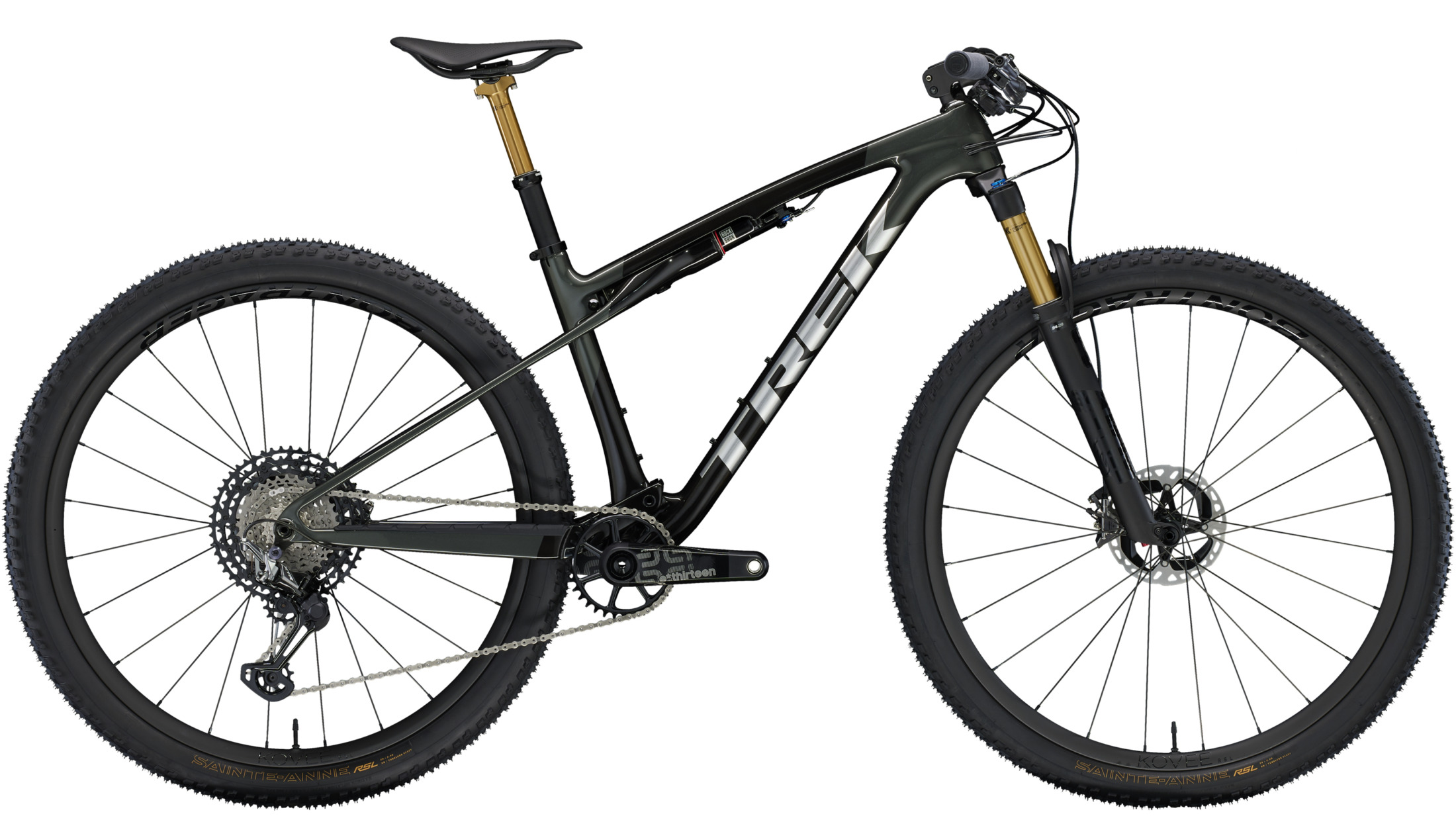
2024 Trek Supercaliber SLR 9.9 XTR
- Frame | SLR OCLV Mountain Carbon, IsoStrut Suspension Design, 80mm Travel
- Fork | Fox 34 Step-Cast, Factory Series, FIT4 Damper w/Lockout, 44mm Offset, 110mm Travel
- Shock | RockShox SIDLuxe IsoStrut w/Lockout, 240x40mm
- Wheels | Bontrager Kovee Pro 30, Carbon Rims, 29mm Inner Width
- Tyres | Bontrager Sainte-Anne RSL XR, 2.4in Front & Rear
- Drivetrain | Shimano XTR 1×12 w/34T e*13 TRS Race Carbon Crankset & 10-51T Cassette
- Brakes | Shimano XTR 2-Piston w/160mm Rotors
- Cockpit | Bontrager RSL Integrated Bar & Stem, OCLV Carbon, 750mm Width
- Seatpost | Fox Transfer SL, Factory Series, 31.6mm Diameter, Travel: 100mm (S-M), 125mm (ML-L), 150mm (XL)
- Saddle | Bontrager Aeolus RSL, Carbon Rails
- Claimed Weight | 9.75kg
- RRP | $17,299 AUD
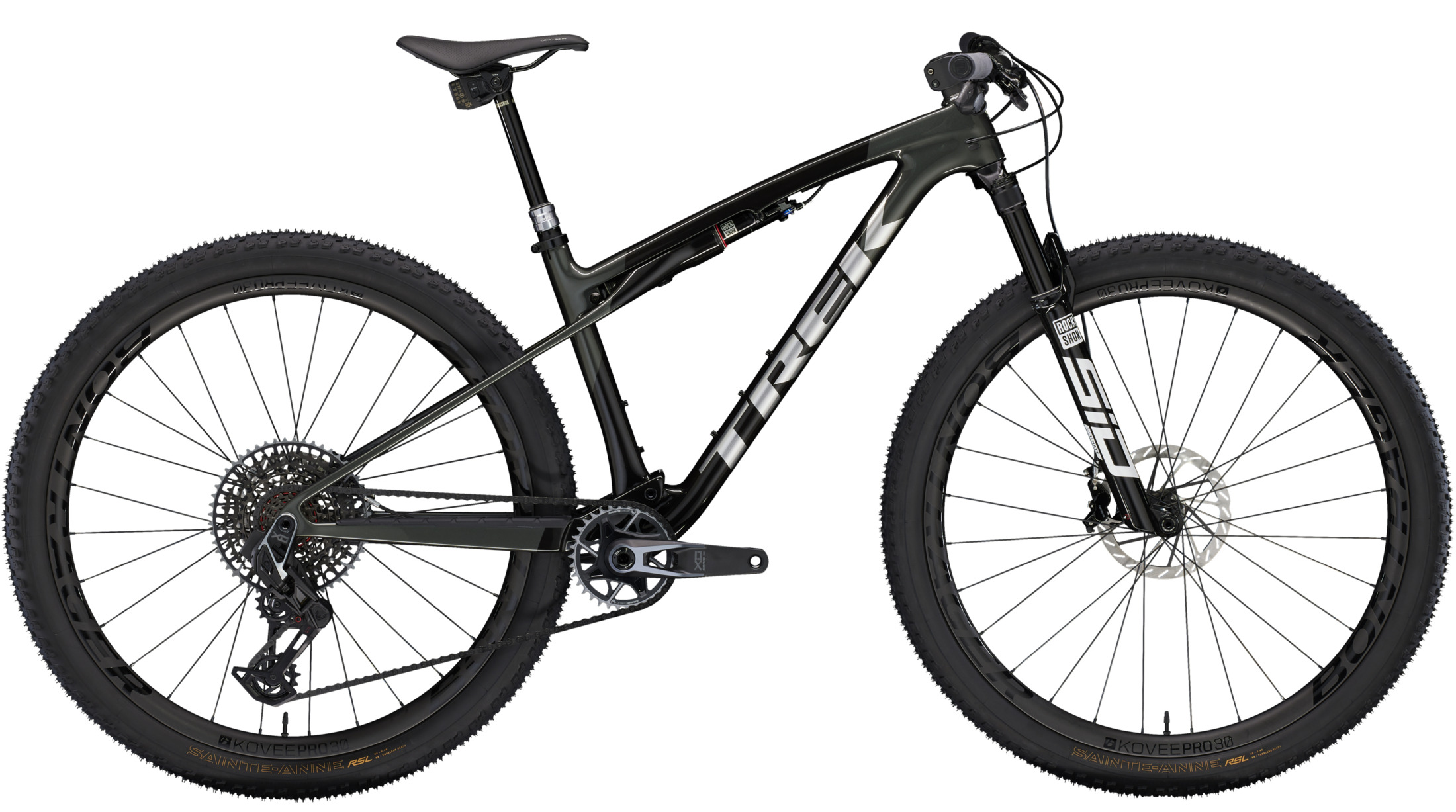
2024 Trek Supercaliber SLR 9.9 X0 AXS
- Frame | SLR OCLV Mountain Carbon, IsoStrut Suspension Design, 80mm Travel
- Fork | RockShox SID Ultimate, Charger Race Day Damper w/Lockout, 44mm Offset, 110mm Travel
- Shock | RockShox SIDLuxe IsoStrut w/Lockout, 240x40mm
- Wheels | Bontrager Kovee Pro, Carbon Rims, 29mm Inner Width
- Tyres | Bontrager Sainte-Anne RSL XR, 2.4in Front & Rear
- Drivetrain | SRAM X0 Eagle AXS Transmission 1×12 w/34T Crankset & 10-52T Cassette
- Brakes | SRAM Level Silver 4-Piston w/180mm Front & 160mm Rear Rotors
- Cockpit | Bontrager RSL Integrated Bar & Stem, OCLV Carbon, 750mm Width
- Seatpost | RockShox Reverb AXS, 31.6mm Diameter, Travel: 100mm (S), 150mm (M-XL)
- Saddle | Bonrager Aeolus Elite, Austentite Rails
- Claimed Weight | 11kg
- RRP | $16,499 AUD
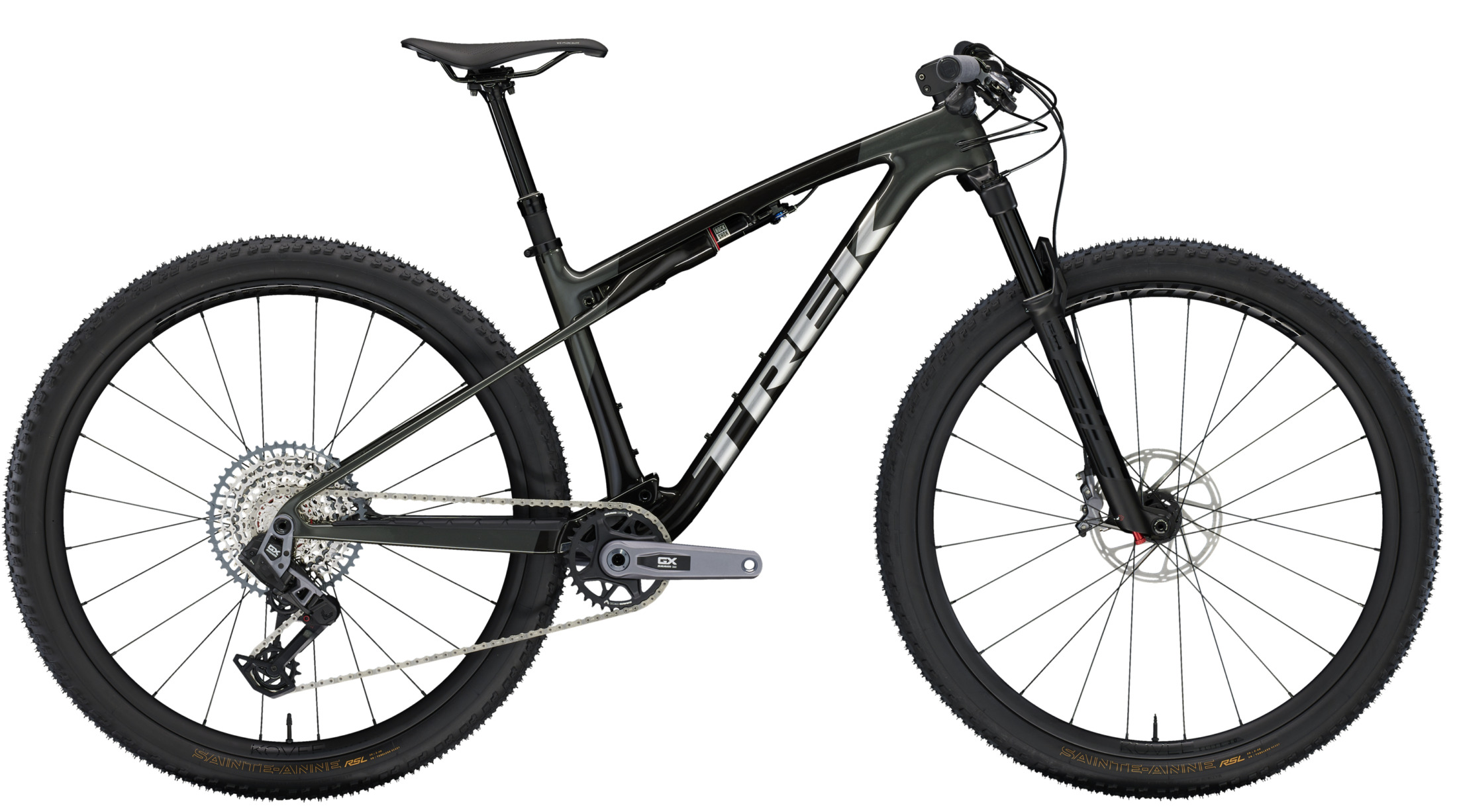
2024 Trek Supercaliber SLR 9.8 GX AXS
- Frame | SLR OCLV Mountain Carbon, IsoStrut Suspension Design, 80mm Travel
- Fork | RockShox SID, Rush RL Damper w/Lockout, 44mm Offset, 110mm Travel
- Shock | RockShox SIDLuxe IsoStrut w/Lockout, 240x40mm
- Wheels | Bontrager Kovee Elite, Carbon Rims, 29mm Inner Width
- Tyres | Bontrager Sainte-Anne RSL XR, 2.4in Front & Rear
- Drivetrain | SRAM GX Eagle AXS Transmission 1×12 w/34T Crankset & 10-52T Cassette
- Brakes | SRAM Level Bronze 4-Piston w/180mm Front & 160mm Rear Rotors
- Cockpit | Bontrager RSL Integrated Bar & Stem, OCLV Carbon, 750mm Width
- Seatpost | Bontrager Line Dropper, 31.6mm Diameter, Travel: 100mm (S), 125mm (M-ML), 150mm (L-XL)
- Saddle | Bonrager Verse Elite, Austentite Rails
- Claimed Weight | 11.28kg
- RRP | $11,999 AUD
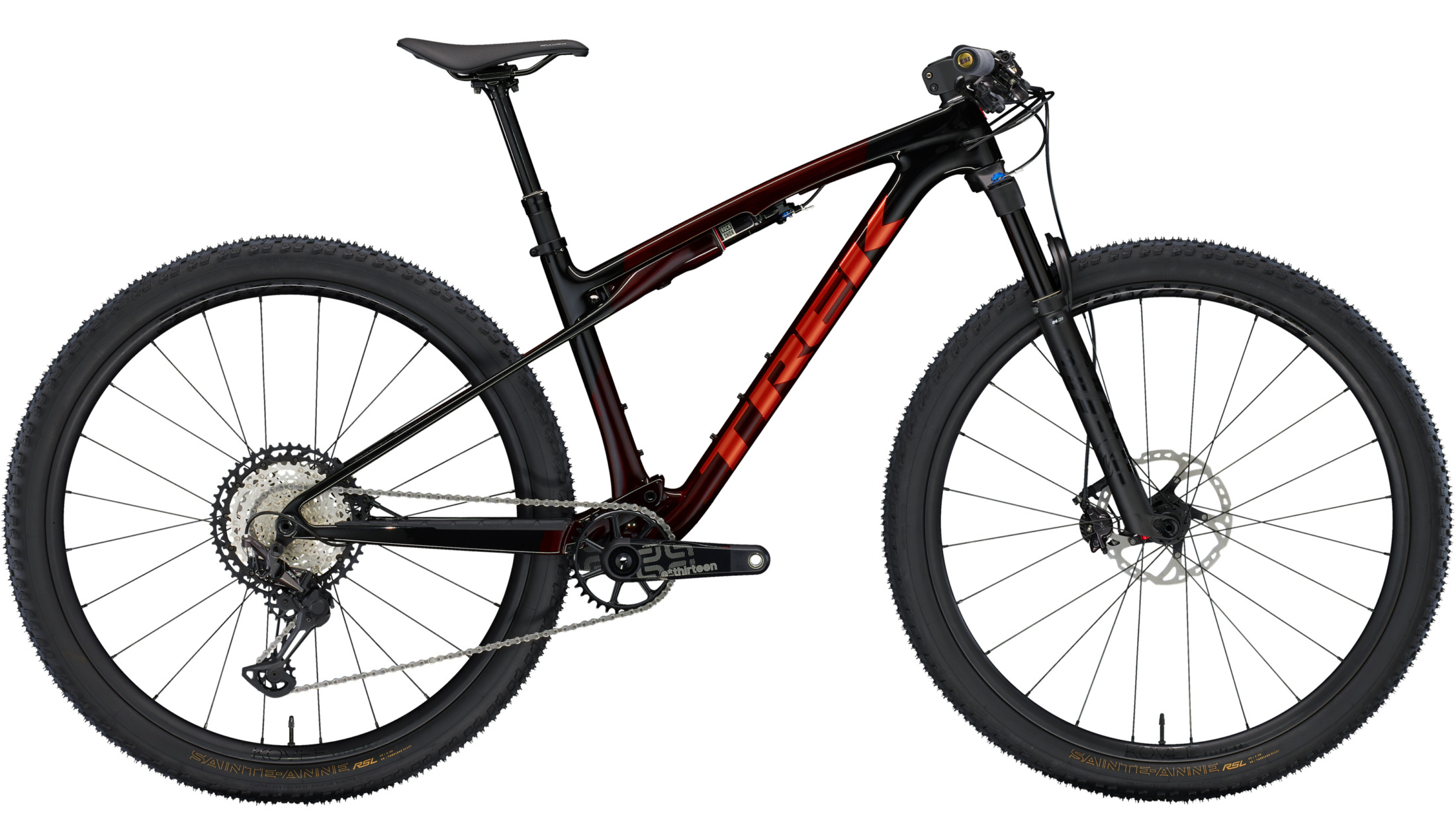
2024 Trek Supercaliber SLR 9.8 XT
- Frame | SLR OCLV Mountain Carbon, IsoStrut Suspension Design, 80mm Travel
- Fork | Fox 34 Step-Cast, Performance Series, GRIP Damper w/Lockout, 44mm Offset, 110mm Travel
- Shock | RockShox SIDLuxe IsoStrut w/Lockout, 240x40mm
- Wheels | Bontrager Kovee Elite 30, Carbon Rims, 29mm Inner Width
- Tyres | Bontrager Sainte-Anne RSL XR, 2.4in Front & Rear
- Drivetrain | Shimano XT 1×12 w/34T e*13 TRS Race Carbon Crankset & 10-51T Cassette
- Brakes | Shimano XT 2-Piston w/180mm Front & 160mm Rear Rotors
- Cockpit | Bontrager RSL Integrated Bar & Stem, OCLV Carbon, 750mm Width
- Seatpost | Bontrager Line Dropper, 31.6mm Diameter, Travel: 100mm (S), 125mm (M-ML), 150mm (L-XL)
- Saddle | Bontrager Aeolus RSL, Carbon Rails
- Claimed Weight | 10.95kg
- RRP | $11,599 AUD
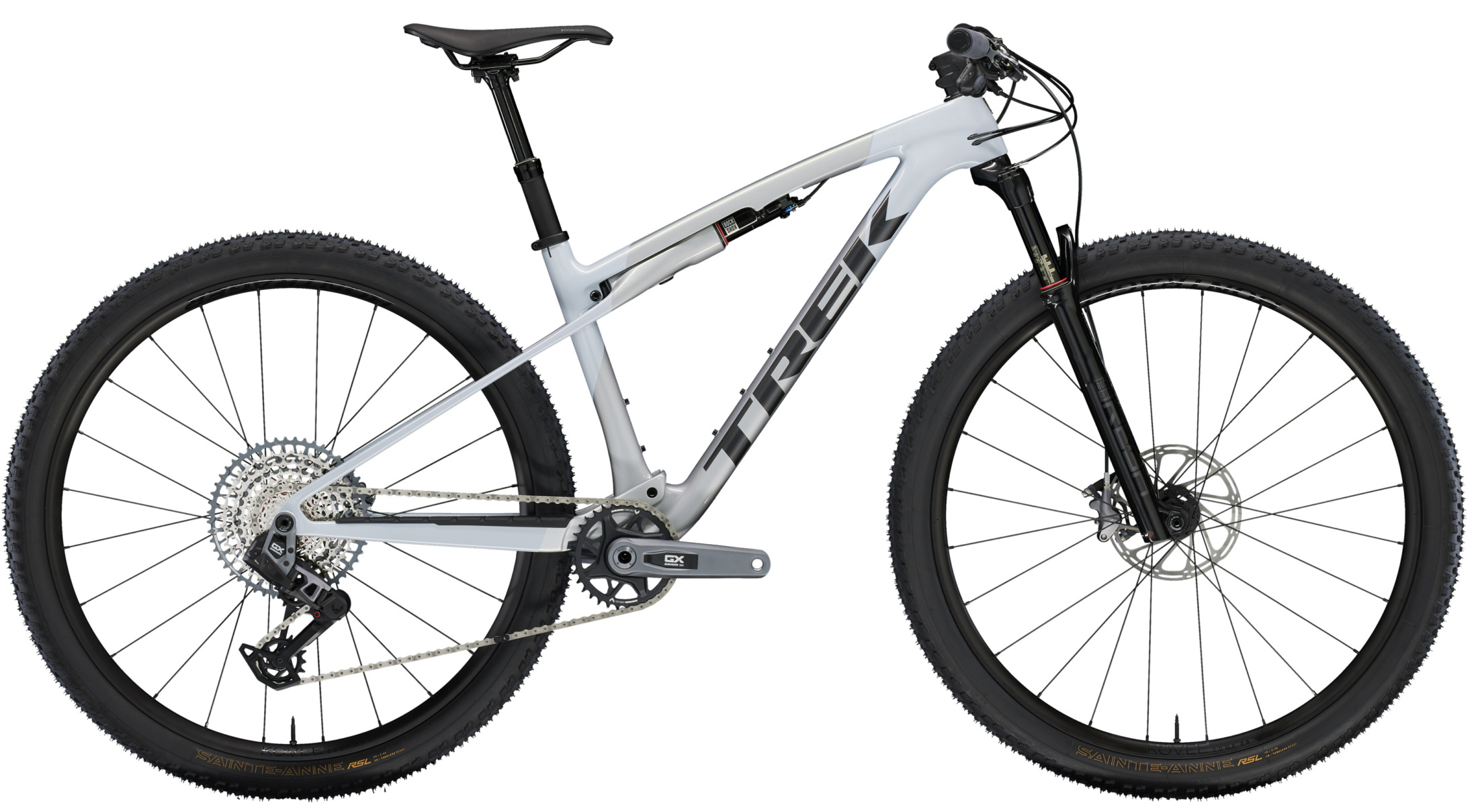
2024 Trek Supercaliber SL 9.7 AXS
- Frame | SL OCLV Mountain Carbon, IsoStrut Suspension Design, 80mm Travel
- Fork | RockShox Reba RL, Motion Control Damper w/Lockout, 42mm Offset, 110mm Travel
- Shock | RockShox SIDLuxe IsoStrut w/Lockout, 240x40mm
- Wheels | Bontrager Kovee Comp 25, Alloy Rims, 25mm Inner Width
- Tyres | Bontrager Sainte-Anne RSL XR, 2.4in Front & Rear
- Drivetrain | SRAM GX Eagle AXS Transmission 1×12 w/34T Crankset & 10-52T Cassette
- Brakes | SRAM Level Bronze 4-Piston w/180mm Front & 160mm Rear Rotors
- Handlebar | Bontrager Line Pro, OCLV Carbon, 750mm Width
- Stem | Bontrager Elite, 35mm Diameter Clamp
- Seatpost | Bontrager Line Dropper, 31.6mm Diameter, Travel: 100mm (S), 125mm (M-ML), 150mm (L-XL)
- Saddle | Bontrager Verse Elite, Austentite Rails
- Claimed Weight | 11.8kg
- RRP | $8,999 AUD



